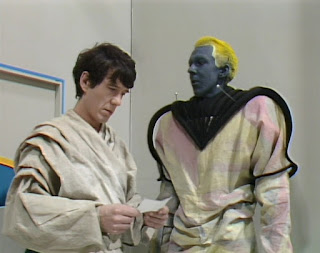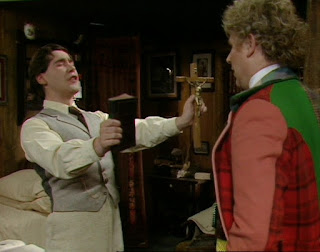The one where the Doctor meets a young H G Wells...
It takes more than 20 minutes for the TARDIS to arrive in the story this week, which must be something of a record. In that time there's the usual arguing and sniping between the belligerent Doctor and whining Peri, with the Time Lord threatening to set the coordinates for 1985 to take her back home (even though Peri's from 1984).
These interminable TARDIS scenes are torture to watch, mostly because of Colin Baker's appalling overacting. Why deliver lines with any panache or pathos when YOU CAN JUST SHOUT THEM?! I know the Sixth Doctor is a loud, brash, short-tempered grouch, but in the first half of this episode Baker takes the character to even crabbier territory than normal (his cacophonous repetition of the word "BAD" is irredeemable). This is his sixth story and I'm still not warming to him. He's a bit better than he was in The Twin Dilemma - and very slightly less homicidal - but still not the charming travelling companion of yore. Boy, do I miss Peter Davison.
The TARDIS takes its time entering the story because it gets caught up in a kontron tunnel, another name for a time corridor (the graphic used to depict it almost gave me a migraine). Peri refers to the Daleks having time corridor technology, even though she wasn't in Resurrection of the Daleks, and the Doctor ascertains that the tunnel leads to Earth in the year 1179.It takes more than 20 minutes for the TARDIS to arrive in the story this week, which must be something of a record. In that time there's the usual arguing and sniping between the belligerent Doctor and whining Peri, with the Time Lord threatening to set the coordinates for 1985 to take her back home (even though Peri's from 1984).
These interminable TARDIS scenes are torture to watch, mostly because of Colin Baker's appalling overacting. Why deliver lines with any panache or pathos when YOU CAN JUST SHOUT THEM?! I know the Sixth Doctor is a loud, brash, short-tempered grouch, but in the first half of this episode Baker takes the character to even crabbier territory than normal (his cacophonous repetition of the word "BAD" is irredeemable). This is his sixth story and I'm still not warming to him. He's a bit better than he was in The Twin Dilemma - and very slightly less homicidal - but still not the charming travelling companion of yore. Boy, do I miss Peter Davison.
Undergoing extreme turbulence, the TARDIS is buffeted about like a wheelie bin in a hurricane, which leads the Doctor to break open the TARDIS seatbelts. Seldom has there been such a ridiculous idea as the TARDIS seatbelts, but to be fair, I can well imagine them being used by the Second Doctor in the more light-hearted Season 6. The TARDIS seatbelts are still A Very Silly Thing though.
While all this bunkum is going on, there are some much more interesting things happening on the planet of Karfel, designed by Bob Cove with about as much flair as a soggy newspaper. The fact there are no reflections or shiny surfaces on Karfel is part of the plot, but the corridors are so "matte and lifeless", as Peri moans, that I'm not surprised this was Cove's only job on Doctor Who. He was more accustomed to designing variety shows like The Generation Game, Blankety Blank and Wogan, and you can tell (although his set for Herbert's Victorian cottage is more promising). Alun Hughes's costumes are also bland - ironic, as he'd worked as wardrobe designer for the vibrant Rigg and Thorson eras of The Avengers - making the whole visual palette drab and limp.
Glen McCoy's story is workmanlike, involving a suppressed population, a bunch of rebels fighting for freedom, and an unseen dictator whose true face remains hidden, which means he's bound to be yet another disfigured monster. The Borad's public face is that of Denis Carey (aka Professor Chronotis and the Keeper of Traken) but it's obvious that the bloke sitting in the wheelie office chair with a fin for a hand is not the kindly grandfather figure we're led to believe.
But while McCoy's story is nothing special, that in itself makes it quite reassuring, because it feels more traditional Doctor Who in a season which is far from that. After all the death and suffering of Season 22's first four stories - the acid bath, the hangings, the disfigurements, the crushings, the stabbings, the spewings, the dismemberment, the cannibalism, the poisoning, the gassing and the shootings - having a cheap-looking runaround with drab corridors and dodgy acting is actually quite refreshing. It has a distinct Graham Williams era vibe.
Don't get me wrong, the script is terribly stagey, with most of the actors struggling to deliver their lines with any degree of truthfulness. Peter Robert Scott in particular gets some doozies as Brunner, such as the moment Tekker says the Borad will kill everybody within the citadel, and Brunner clarifies: "All 500 of us?", or the lifeless line: "There's nothing that way except rebels, dank tunnels and the Morlocks." There's an awful lot of unsayable dialogue, much of it designed to tell the viewer something that the characters would already know, and not need to say - the conversation between Mykros and Vena about "our former allies, the Bandrils" for instance!
Rising above the dross, however, is the fantastic Paul Darrow, who grabs the part of Tekker with both hands and flies with it. OK, he's monumentally over the top, and chews the scenery like he hasn't eaten for a week, but at least he's bringing something to the table. He gives a lively, interesting performance which, while much larger than everybody else's, at least feels actorly, albeit in a way better suited to the Globe Theatre than Television Centre. People knock Darrow's performance in Timelash, but I think he's the best thing on screen - and that includes the regulars - and gives more than value for money. "Save your breath for the Timelash, Doctor," he sneers. "Most people depart with a scream." Magnificent!
There are elements of Timelash I like: the blond-haired, blue-skinned android is wonderfully strange, its sing-song voice making it a memorable creation (and I do like Dean Hollingsworth's wistful "Yes indeed she was" when referring to how attractive Peri is); the brief effect of Vena travelling along the kontron tunnel and through the TARDIS, like a ghost on the wind; the references to a previous visit by the Third Doctor, Jo Grant and a mystery third person ("Only the two of you?"), leading to the Doctor passing into Karfelon legend and becoming a subject taught in school; the way Darrow shoves the supposedly poisonous plant in Colin Baker's face with a flourish.
Best of all is when, 31 minutes in, the action suddenly moves to a bothy on the Scottish moors in the year 1885, where we find a young man called Herbert trying to communicate with the dead using a ouija board. It's so startlingly different to the cheapjack events on Karfel, but so very welcome. David Chandler is wonderful as the rather sweet, excitable Herbert, a trainee teacher who hopes one day to become a writer. It's not made obvious in part 1 (so I'm jumping ahead of myself here) but the fact this is a young H G Wells is a delightfully fun twist. McCoy's biographical research of Wells is impressive, and the events of Timelash are obviously intended to be Herbert's inspiration for his 1895 novel The Time Machine (though it's more likely to be inspiration for that novel's precursor, the 1888 short story The Chronic Argonauts, with the Doctor serving as inspiration for the character Dr Moses Nebogipfel).
Chandler plays Herbert like a less annoying Adric, his impish enthusiasm endearing him straight away. His attempt to exorcise the Doctor upon his arrival is particularly amusing - "Avaunt thee, foul-fanged fiend! Back from where you came, spirit of the glass!" - as he waves a Bible and crucifix at the admittedly unsettling vision that is Colin Baker. Herbert feels protective of Vena, his "spirit from the other side", and somehow Chandler and the rather flat Jeananne Crowley manage to develop a nice little connection very quickly and easily.
Aside from these small victories, Timelash is more heavily laden with failings, like the gun-toting guardoliers that are obviously dressed as beekeepers; the awfulness of the Timelash itself, decorated with Christmas tinsel; the way Renis's skeleton falls to the floor with a comical clunk when the Borad ages him to death; the fact the Bandril ambassador is a rubbish hand puppet; and that the Morlock is a big green-eyed worm that just wiggles a lot; the Borad's tiresome attraction to Peri ("A plucky creature") in what looks set to be yet another example of an ugly monster fancying the Doctor's companion; the Doctor's use of "microcephalic apostate" as an insult (he's basically calling Tekker a small-headed nonconformist, hardly the wittiest put-down).
The cliffhanger's disappointingly predictable, with the Doctor being put to death in the Timelash (Colin Baker's gurning expression is laughable). Death by tinsel?
First broadcast: March 9th, 1985
Steve's Scoreboard
The Good: David Chandler's spirited Herbert.
The Bad: Any scene involving the TARDIS. Oh, and that tinsel.
Overall score for episode: ★★★★★☆☆☆☆☆
Steve's Scoreboard
The Good: David Chandler's spirited Herbert.
The Bad: Any scene involving the TARDIS. Oh, and that tinsel.
Overall score for episode: ★★★★★☆☆☆☆☆
Word repetition: 7 - not one, but two cases in this episode. Firstly, the Doctor screams the word "BAD" three times in one of Colin Baker's worst examples of overacting, and later repeats "I know" when Herbert states that the TARDIS is bigger on the inside.
NEXT TIME: Part Two...
My reviews of this story's other episodes: Part Two
Find out birth/death dates, career information, and facts and trivia about this story's cast and crew at the Doctor Who Cast & Crew site.
Timelash is available on BBC DVD. Find it on Amazon - https://www.amazon.co.uk/Doctor-Who-Timelash-Colin-Baker/dp/B000NVI2G0
NEXT TIME: Part Two...
My reviews of this story's other episodes: Part Two
Find out birth/death dates, career information, and facts and trivia about this story's cast and crew at the Doctor Who Cast & Crew site.
Timelash is available on BBC DVD. Find it on Amazon - https://www.amazon.co.uk/Doctor-Who-Timelash-Colin-Baker/dp/B000NVI2G0











No comments:
Post a Comment
Have you seen this episode? Let me know what you think!